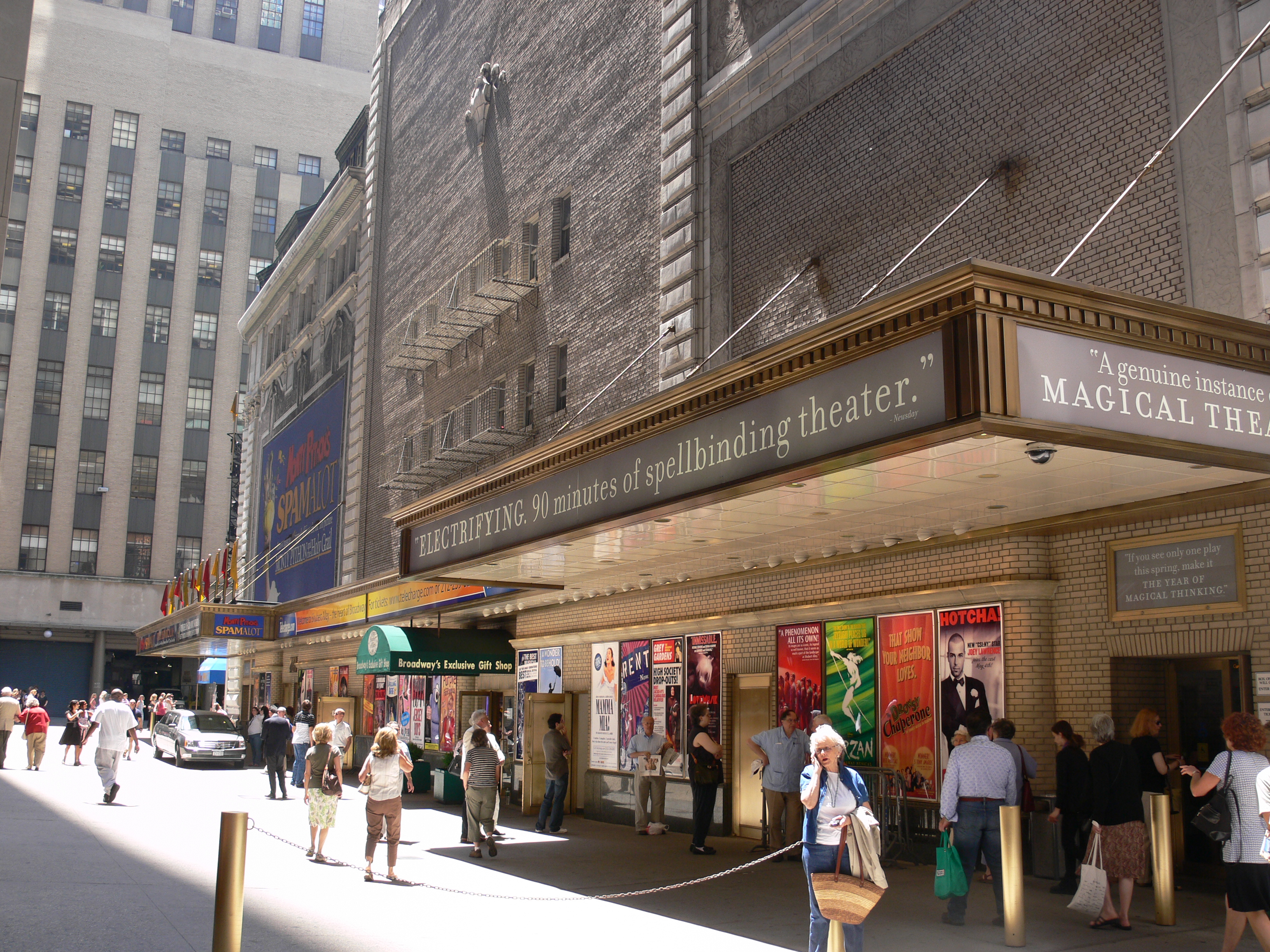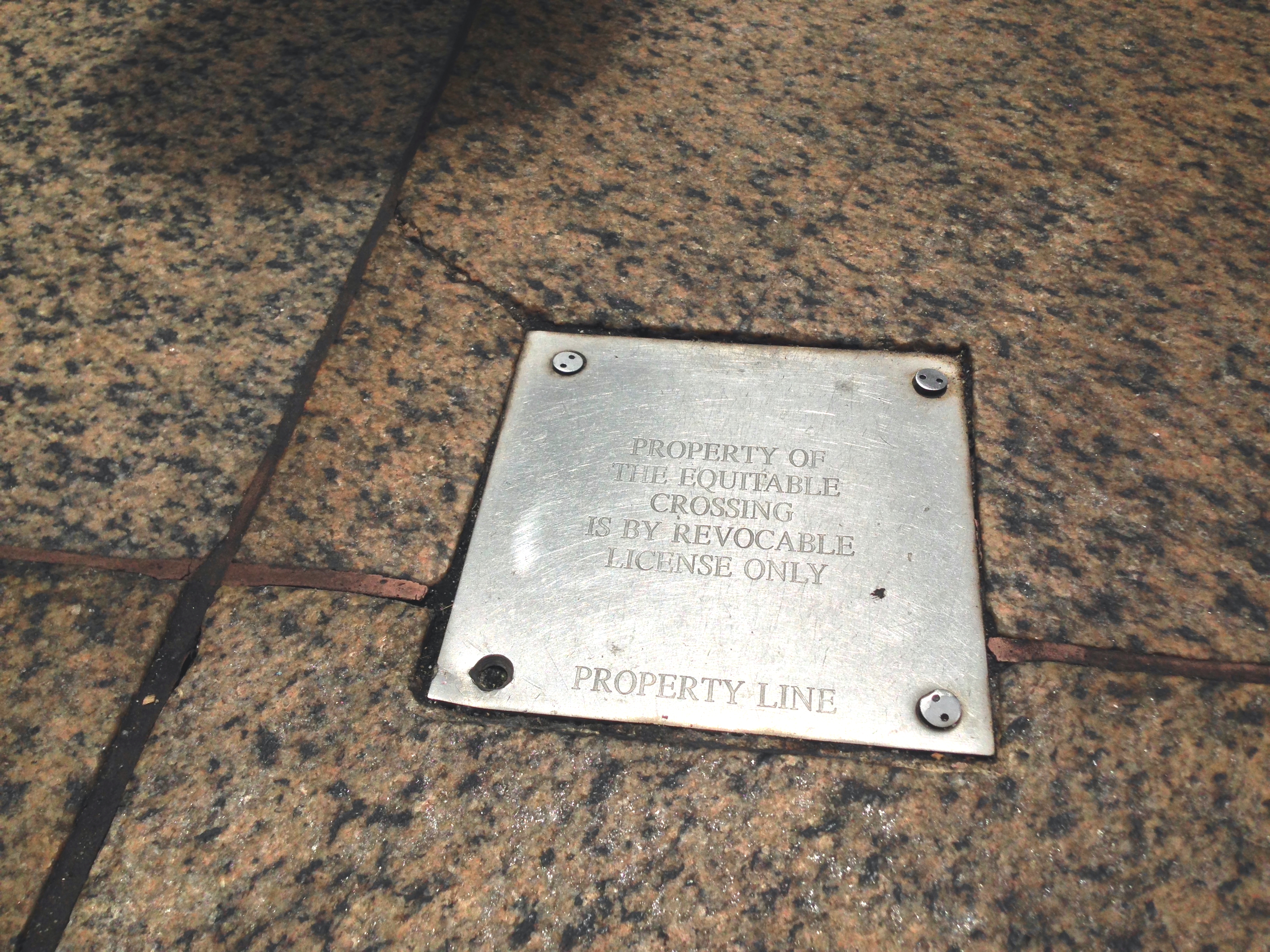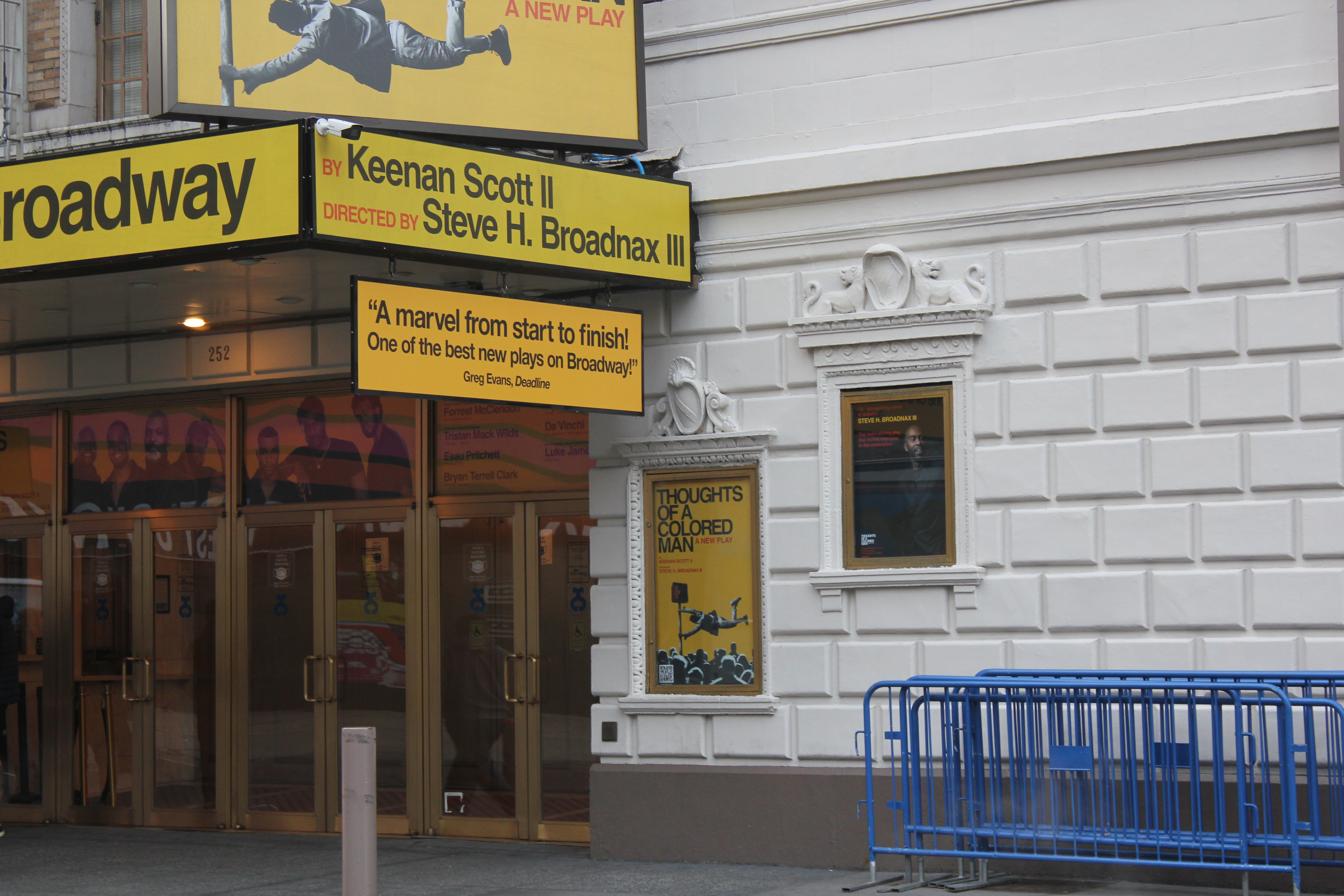|
Shubert Alley
Shubert Alley is a pedestrian alley in the Theater District of Midtown Manhattan in New York City. The alley, a privately owned public space, connects 44th and 45th Streets and covers about . It runs through the middle of a city block, parallel to Eighth Avenue to the west and Broadway to the east. The western half of the alley abuts the Shubert and Booth theaters, while the eastern half is adjacent to One Astor Plaza. Because it is near several major theaters, the alley has been considered the geographical center of Broadway theatre. The alley was built along with the Shubert and Booth theaters in 1913. The Shubert family parked their cars in the alley, which was gated and locked at night. Actors would gather in the alley while waiting to try out for parts, lining up along the western wall. In the 1930s, the alley was fenced off and part of it was used as a bus terminal. The eastern half of the alley, which faced the Astor Hotel, was rebuilt when the hotel was demolished ... [...More Info...] [...Related Items...] OR: [Wikipedia] [Google] [Baidu] |
Booth Theatre Shubert Theatre NYC 2007
Booth may refer to: People * Booth (surname) * Booth (given name) Fictional characters * August Wayne Booth, from the television series ''Once Upon A Time'' *Cliff Booth, a supporting character of the 2019 film '' Once Upon a Time in Hollywood'', played by Brad Pitt * Frank Booth (Blue Velvet), main villain of the 1986 film ''Blue Velvet'', played by Dennis Hopper *Missy Booth, a main character on the television series ''Ackley Bridge'', played by Poppy Lee Friar *Seeley Booth, a main character on the television series ''Bones'', played by David Boreanaz Places Antarctica * Mount Booth * Booth Spur * Booth Island Canada * Booth Island (Nunavut) England * Booth, East Riding of Yorkshire, a small village * Booth Park, a cricket ground in Toft, Cheshire United States * Booth, Alabama, an unincorporated community * Booth, Missouri, a ghost town * Booth, Texas, an unincorporated community * Booth Farm, Pennsylvania, on the National Register of Historic Places * Booth Ho ... [...More Info...] [...Related Items...] OR: [Wikipedia] [Google] [Baidu] |
Broadway Cares/Equity Fights AIDS
Broadway Cares/Equity Fights AIDS (BC/EFA) is an American nonprofit organization that raises funds for AIDS-related causes across the United States, headquartered in New York City. It is the theatre community's response to the HIV/AIDS epidemic. By drawing upon the talents, resources and generosity of the American theatre community, BC/EFA has raised over $300 million for critically needed services for people with AIDS, HIV, and other critical illnesses since its founding in 1988. The organization awards annual grants to over 450 AIDS and family service organizations across all 50 states, Puerto Rico & Washington D.C., and is the single largest financial supporter of the social service programs of The Actors Fund. History Broadway Cares/Equity Fights AIDS was originally two separate organizations. In October 1987, the Council of Actors' Equity Association founded Equity Fights AIDS, and in February 1988, The Producers' Group founded Broadway Cares, both in response to the growi ... [...More Info...] [...Related Items...] OR: [Wikipedia] [Google] [Baidu] |
Act One (film)
''Act One'' is a 1963 American film directed and screenwritten by Dore Schary and starring George Hamilton. It is the film version of the 1959 autobiographical book '' Act One'' by playwright Moss Hart. A play based on the book premiered on Broadway in 2014. George Hamilton later complained that "Schary de-ethnicized the entire production and took out the brilliance for good measure".George Hamilton & William Stadiem, ''Don't Mind If I Do'', Simon & Schuster 2008 p 183 Plot In 1929, 25-year-old Brooklynite Moss Hart lives with his parents and works hard in the summer so he has time to write plays in the winter. Hart is also encouraged by his friend, Joe Hyman, who occasionally lends him money as well as moral support. Eventually, after 4 years and 5 attempts at serious drama, he takes the advice of agent Richard Maxwell and “discards the mantle of O'Neill and Ibsen and Shaw” to write a comedy, ''Once in a Lifetime''. Inspired by the newspaper headline “Talkies sweep ... [...More Info...] [...Related Items...] OR: [Wikipedia] [Google] [Baidu] |
Jacob J
Sir Robert Raphael Hayim "Robin" Jacob, PC (born 26 April 1941) is a former judge in the Court of Appeal of England and Wales. Personal life Jacob's father was Sir Jack Jacob, a Senior Master of the High Court who is well-known for editing the White Book on civil procedure in the UK. Education and professional career He read Natural Sciences (physics) at Trinity College, Cambridge (1960-1963) and law at the London School of Economics (1963-1967). He was called to the bar by Gray's Inn in 1965 (Treasurer 2007). From 1976 to 1981, he was the Junior Counsel for the Comptroller of Patents and for Government departments in intellectual property. He took silk in 1981. In 1993, he was appointed a High Court judge (a designated Patent Judge) and to the Court of Appeal in 2003. His primary area of expertise is intellectual property rights. He was admitted to the IP Hall of Fame in 2006. He was awarded the Outstanding Achievement in IP award by MIP in 2012. The position he held b ... [...More Info...] [...Related Items...] OR: [Wikipedia] [Google] [Baidu] |
Lee Shubert
Lee Shubert (born Levi Schubart; March 25, 1871– December 25, 1953) was a Lithuanian-born American theatre owner/operator and producer and the eldest of seven siblings of the theatrical Shubert family. Biography Born to a Jewish family, the son of Duvvid SchubartSome sources cite Shubard or Szemanski as the original spelling and Katrina Helwitz, in Vladislavov, in the Suwałki Governorate of Congress Poland, a part of the Russian Empire (present-day Kudirkos Naumiestis, Lithuania), Shubert was 11 years old when the family emigrated to the United States and settled in Syracuse, New York, where a number of Jewish families from their hometown already were living. His father's alcoholism kept the family in difficult financial circumstances, and Lee Shubert went to work selling newspapers on a street corner. With borrowed money, he and younger brothers Sam and Jacob eventually embarked on a business venture that led to them to become the successful operators of several theaters in u ... [...More Info...] [...Related Items...] OR: [Wikipedia] [Google] [Baidu] |
Henry Beaumont Herts
Henry Beaumont Herts (January 23, 1871 – March 27, 1933) was an American architect. Herts was born in New York City, attended Columbia University without graduating, and apprenticed under Bruce Price. He studied architecture in Europe at the École nationale supérieure des Beaux-Arts in Paris and at the Universities of Rome and Heidelberg. In 1900 Herts, with partner Hugh Tallant, formed Herts & Tallant and became known for their theater designs. Tallant was the designer, and Herts serving as the engineer and businessperson. The 1903 New Amsterdam Theatre was their first big success, followed by the Fulton (razed in 1982), the Gaiety (razed in 1982), the Liberty (defunct in 1933), the Lyceum, the New German Theatre, and the Brooklyn Academy of Music. Herts perfected the cantilevered arch construction that enabled theater architects to support balconies without the use of columns.''Broadway: Its History, People, and Places: An Encyclopedia'', by Ken Bloom, Taylor & Franc ... [...More Info...] [...Related Items...] OR: [Wikipedia] [Google] [Baidu] |
New York City Landmarks Preservation Commission
The New York City Landmarks Preservation Commission (LPC) is the New York City agency charged with administering the city's Landmarks Preservation Law. The LPC is responsible for protecting New York City's architecturally, historically, and culturally significant buildings and sites by granting them landmark or historic district status, and regulating them after designation. It is the largest municipal preservation agency in the nation. , the LPC has designated more than 37,000 landmark properties in all five boroughs. Most of these are concentrated in historic districts, although there are over a thousand individual landmarks, as well as numerous interior and scenic landmarks. Mayor Robert F. Wagner Jr. first organized a preservation committee in 1961, and the following year, created the LPC. The LPC's power was greatly strengthened after the Landmarks Law was passed in April 1965, one and a half years after the destruction of Pennsylvania Station. The LPC has been involved ... [...More Info...] [...Related Items...] OR: [Wikipedia] [Google] [Baidu] |
Adverse Possession
Adverse possession, sometimes colloquially described as "squatter's rights", is a legal principle in the Anglo-American common law under which a person who does not have legal title to a piece of property—usually land ( real property)—may acquire legal ownership based on continuous possession or occupation of the property without the permission ( licence) of its legal owner. The possession by a person is not adverse if they are in possession as a tenant or licensee of the legal owner. In general, a property owner has the right to recover possession of their property from unauthorised possessors through legal action such as ejectment. However, in the English common law tradition, courts have long ruled that when someone occupies a piece of property without permission and the property's owner does not exercise their right to recover their property for a significant period of time, not only is the original owner prevented from exercising their right to exclude, but an entir ... [...More Info...] [...Related Items...] OR: [Wikipedia] [Google] [Baidu] |
The Shubert Organization
The Shubert Organization is a theatrical producing organization and a major owner of theatres based in Manhattan, New York City. It was founded by the three Shubert brothers in the late 19th century. They steadily expanded, owning many theaters in New York and across the country. Since then it has gone through changes of ownership, but is still a major theater chain. History The Shubert Organization was founded by the Shubert brothers, Sam S. Shubert, Lee Shubert, and Jacob J. Shubert of Syracuse, New York – colloquially and collectively known as "The Shuberts" – in the late 19th century in upstate New York, entering into New York City productions in 1900. The organization produced a large number of shows and began acquiring theaters. Sam Shubert died in 1905; by 1916 the two remaining brothers had become powerful theater moguls with a nationwide presence. In 1907, the Shuberts tried to enter vaudeville with the United States Amusement Co. In the spring of 1920 they made ... [...More Info...] [...Related Items...] OR: [Wikipedia] [Google] [Baidu] |
Gerald Schoenfeld Theatre
The Gerald Schoenfeld Theatre, formerly the Plymouth Theatre, is a Broadway theater at 236 West 45th Street in the Theater District of Midtown Manhattan in New York City. Opened in 1917, the theater was designed by Herbert J. Krapp and was built for the Shubert brothers. The Schoenfeld Theatre is named for Gerald Schoenfeld, longtime president of the Shubert Organization, which operates the theater. It has 1,079 seats across two levels. Both the facade and the auditorium interior are New York City landmarks. The neoclassical facade is simple in design and is similar to that of the Broadhurst Theatre, which was developed concurrently. The Schoenfeld's facade is made of buff-colored brick and terracotta and is divided into two sections: a stage house to the west and the theater's entrance to the east. The entrance facade is topped by fire-escape galleries and contains a curved corner facing east toward Broadway. The auditorium contains an orchestra level, a large balcony, ... [...More Info...] [...Related Items...] OR: [Wikipedia] [Google] [Baidu] |
Bernard B
Bernard (''Bernhard'') is a French and West Germanic masculine given name. It is also a surname. The name is attested from at least the 9th century. West Germanic ''Bernhard'' is composed from the two elements ''bern'' "bear" and ''hard'' "brave, hardy". Its native Old English reflex was ''Beornheard'', which was replaced by the French form ''Bernard'' that was brought to England after the Norman Conquest. The name ''Bernhard'' was notably popular among Old Frisian speakers. Its wider use was popularized due to Saint Bernhard of Clairvaux (canonized in 1174). Bernard is the second most common surname in France. Geographical distribution As of 2014, 42.2% of all known bearers of the surname ''Bernard'' were residents of France (frequency 1:392), 12.5% of the United States (1:7,203), 7.0% of Haiti (1:382), 6.6% of Tanzania (1:1,961), 4.8% of Canada (1:1,896), 3.6% of Nigeria (1:12,221), 2.7% of Burundi (1:894), 1.9% of Belgium (1:1,500), 1.6% of Rwanda (1:1,745), 1.2% of German ... [...More Info...] [...Related Items...] OR: [Wikipedia] [Google] [Baidu] |
John Golden Theatre
The John Golden Theatre, formerly the Theatre Masque and Masque Theater, is a Broadway theater at 252 West 45th Street ( George Abbott Way) in the Theater District of Midtown Manhattan in New York City. Opened in 1927, the Golden Theatre was designed by Herbert J. Krapp in a Spanish style and was built for real-estate developer Irwin S. Chanin. It has 800 seats across two levels and is operated by The Shubert Organization. Both the facade and the auditorium interior are New York City landmarks. The facade is designed in a Spanish style with golden brick, terracotta, and stone. The ground floor, which contains the theater's entrance, is clad in rusticated blocks of terracotta above a granite water table. Above are a set of three double-height arches, as well as two terracotta plaques. The facade is topped by a loggia. The auditorium contains Spanish-style detailing, a large balcony, and a rib-arched ceiling. Due to the theater's small size, it lacks box seats. The balcony, ... [...More Info...] [...Related Items...] OR: [Wikipedia] [Google] [Baidu] |





